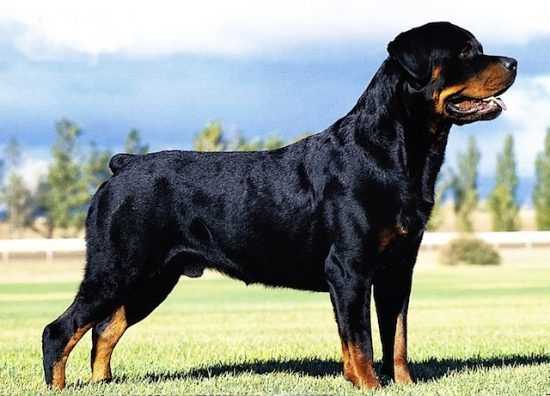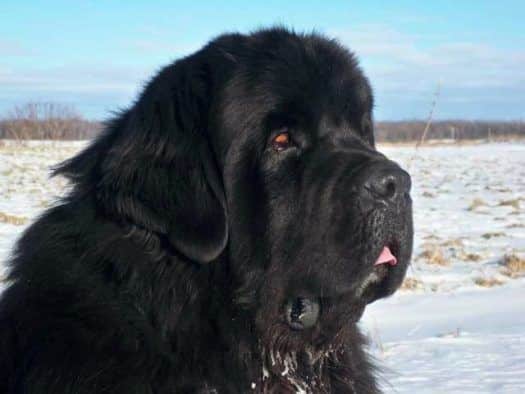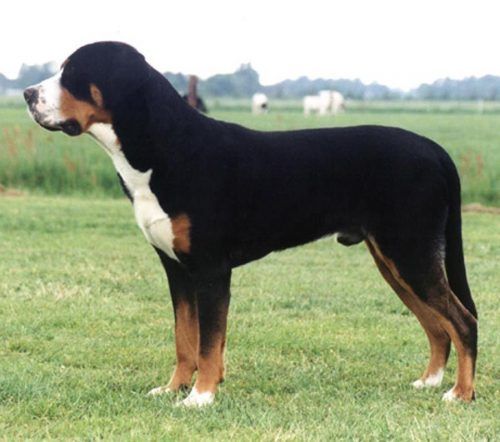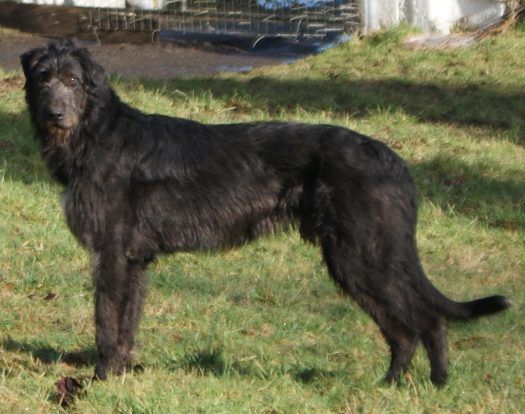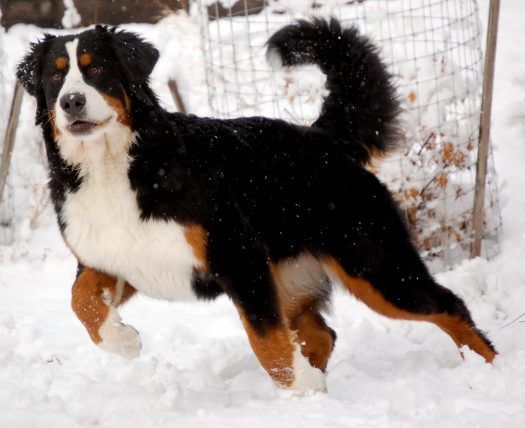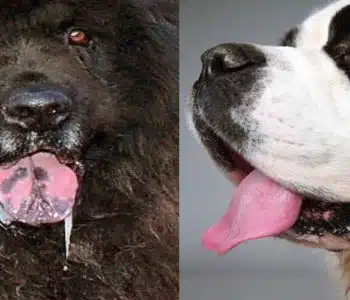
Top 10 Dog Breeds With Shortest Lifespan
Sadly, larger dogs are prone to health issues at earlier stages in life and can’t get dog insurance. The accelerated growth of larger dogs is thought to cause various health problems. Although it is unknown what actually causes the numerous health problems, many link their short life span to breeding practices throughout the century.
Scottish Deerhound: 8-11 years
This gentle giant breed may develop an array of health problems early on in life. Heart disease is common in the Deerhound.

Rottweiler: 8-11 years
Rottweilers need lots of activities and exercise from an early age. The breed can develop a number of major health problems later in life. These health problems can include canine hip dysplasia, gastric torsion, bone cancer, and elbow dysplasia.
Saint Bernard: 8-10 years
The very fast growth rate and the weight of a St. Bernard can lead to very serious deterioration of their bones. St. Bernard requires a proper diet and plenty of exercises. Osteosarcoma (bone cancer) has been shown to be hereditary in the breed. St. Bernards are also susceptible to epilepsy and seizures, a heart disease called dilated cardiomyopathy, and eczema.
Newfoundland: 8-10 years
Named after the Canadian province, the Newfoundland or “Newfie” is an equal companion as it is a worker. Newfie suffers from a genetic problem called subvalvular aortic stenosis or SAS. This is a common heart defect affecting the heart valves. Newfoundlands are prone to arthritis and hip dysplasia as well.
Bullmastiff: 7-8 years
Originally developed by 19th-century gamekeepers to guard estates. The Bullmastiff’s loyalty and adaption to home environments have made it a very popular domesticated breed. This fun-loving breed also comes with numerous health-related problems. Lymphoma, bloat, hip & elbow dysplasia, and arthritis are common health problems with the breed. 1 in 4 will develop hip dysplasia.
Great Dane: 7-8 years
Holding the Guinness World Records for being the tallest dog, the Great Dane unfortunately comes with an array of health problems that shorten its life. The breed has a very slow metabolism rate, which results in less energy and food consumption . Bloat and hip dysplasia is also very common in Great Danes. This breed is nicknamed by Veterinarians the “heartbreak” breed for its numerous heart-related diseases.
Greater Swiss Mountain Dog: 6-8 years
The swissie is an all around working dog. The breed is known for and excels in herding cattle, pulling heavy loads, and standing guard. This large breed does come with a few health problems typical in larger breed dogs. Hip dysplasia and bloat is very common.
Mastiff: 6-8 years
This dog breed can weigh up to 225 pounds! The breed dates back to over 5,000 years unfortunately the sheer size of this breed contributes to the short lifespan.
Irish Wolfhound: 6-7 years
Originating from Ireland, the Irish Wolfhound is another big dog whose life is cut short due to its massive size. Dilated cardiomyopathy and bone cancer are the leading cause of death and like all deep-chested dogs, gastric torsion (bloat) is common as well. The breed is affected by hereditary intrahepatic portosystemic shunt also.
Bernese Mountain Dog: 5-7 years
Top 10 Longest Living Dog Breeds
The Bernese Mountain Dog is known for their wonderful temperament, intelligence, affection and loyalty.
The reason why the Bernese have such a short lifespan is due to the small gene pool they are bred with. Common health problems associated with the breed include hip and elbow dysplasia, gastric dilation, bloat, and eye issues such as congenital cataracts. They also have a higher risk of cancers such as osteosarcomas, mast cell tumors, and lymphoma as well.
If you enjoyed reading this article, here are more that you may like.
- What do Daxies Use Their Tail For?
- What Is Pyoderma in Dogs?
- Life Abundance Dog Food Review
- Dog Ear Yeast Infections
- Dog Ear Infections
- Dog Eye Infections
Top 3 Best Dog Food for Your a Furry Friend
When it comes to providing optimum nutrition for your furry friend, selecting the right dog food is crucial. Discovering the top 3 best options will ensure your dog enjoys a balanced diet tailored to their specific needs and preferences.

- Features farm-raised beef as the number one ingredient and this naturally delicious premium food is made with added vitamins, minerals and nutrients.
- Made without artificial preservatives or flavors and with colors only from natural sources.
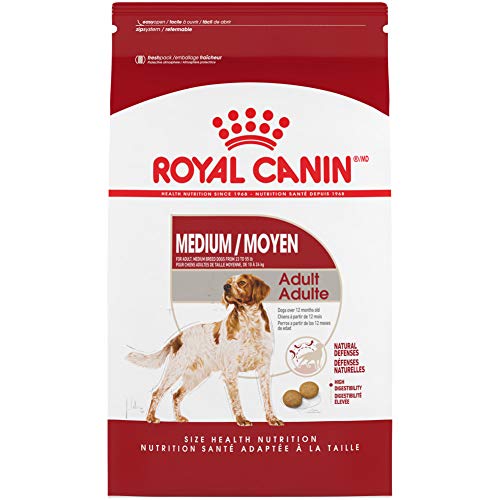
- Medium adult dry dog food formulated with precise nutrition specifically made for dogs 1–7 years old weighing 23–55 lb.
- Supports natural defenses for immune support with a blend of prebiotics and antioxidants for dogs.
- Maintains healthy skin and a healthy dog coat with optimal levels of EPA and DHA.
- Promotes dog digestive health with easy-to-digest proteins and a balanced supply of fiber.
- Palatable, medium breed adult dog food has an exclusive kibble design to encourage chewing.

- Complete and balanced nutrition has antioxidants, vitamins and minerals to help maintain a healthy lifestyle.
- Optimal levels of omega-6 fatty acid nourish the skin and help keep his coat shiny and healthy.
- Whole grains and a special fiber blend support healthy digestion with a delicious roasted chicken flavor.
- Unique, crunchy texture helps clean the teeth with every bite to support good oral health between brushings.
- Proudly made in the USA with the world’s finest ingredients; contains no high fructose corn syrup, artificial flavors or sugar.
(FAQs) about dog breeds with the shortest lifespan:
Which dog breeds are known for having the shortest lifespan?
Breeds such as the Great Dane, Saint Bernard, Irish Wolfhound, Mastiff, and Newfoundland are known for having relatively shorter lifespans compared to smaller breeds.
What factors contribute to shorter lifespans in certain dog breeds?
The One Thing Pet Owners Regret Not Doing Until It’s Too Late
Is your pet safe?
1 in 3 pets will need emergency veterinary treatment each year and it is estimated a pet receives emergency care every 2.5 seconds in the U.S.
The average cost of treating a broken bone in dogs is $2,700. Cancer treatments? Up to $10,000.
It’s why so many pet owners say their biggest regret isn’t the vet bill—it’s not having pet insurance when they needed it most.
Ask yourself: “If an unexpected $5,000 vet bill hit tomorrow, could I afford it?”
If the answer is no, it’s time to get covered.
Take a look at Lemonade. They have a great app that actually works, they have an instant chatbot that is faster and, dare we say it, friendlier than most companies’ “real” customer service and a quick scroll through Reddit will uncover… people are really vibing with this brand.
So go check them out and take a look. It takes less than a minute.
Larger breeds tend to have shorter lifespans, and factors such as genetics, size, and breed-specific health issues can influence the overall longevity of a dog.
What is the average lifespan of large breeds with shorter lifespans?
Large breeds with shorter lifespans may typically live around 6 to 10 years, depending on the specific breed and individual health.
Do smaller dog breeds generally live longer?
Yes, smaller dog breeds generally have longer lifespans. Small breeds like Chihuahuas, Dachshunds, and Toy Poodles, for example, may live well into their teens or even longer.
Are there exceptions among large breeds with longer lifespans?
Yes, while certain large breeds have shorter lifespans, individual dogs within those breeds can sometimes exceed the average lifespan if they are well-cared-for and free of significant health issues.
What are some common health concerns in large breeds with shorter lifespans?
Large breeds often face health issues such as joint problems, heart conditions, and certain cancers, which can contribute to their shorter lifespans.
How can owners promote the well-being of dogs with shorter lifespans?
Regular veterinary check-ups, a balanced diet, appropriate exercise, and early detection of potential health issues can contribute to the overall well-being and longevity of dogs, regardless of breed.
Are there lifestyle adjustments recommended for owners of breeds with shorter lifespans?
Owners of breeds with shorter lifespans should be mindful of age-related health changes and adapt their dogs’ care routines accordingly. This may include adjustments to diet, exercise, and veterinary care.
What are the advantages of choosing a breed with a shorter lifespan?
While shorter lifespans can be challenging, these breeds often bring unique qualities and characteristics that can make the time spent with them incredibly rewarding.
How can prospective dog owners prepare for the shorter lifespan of certain breeds?
Prospective owners should thoroughly research the specific needs and potential health concerns of the chosen breed. Understanding and addressing these factors can help create a fulfilling and positive experience for both the dog and its owner.
80% of Dogs Develop Arthritis or Joint Pain by 7 Years old – Here’s How to Protect Them
Most of us train our dogs when they are puppies to jump up on furniture. We think it’s harmless (and easier than always lifting them), but for dogs, couches and beds are very high compared to the size of their bodies.
Every time they jump it compresses their back and applies enormous force to their joints.
It’s no wonder that an incredible 80% of dogs experience arthritis or joint pain by only 7 years old.
Luckily, there is a vet-recommended solution.
It’s the PawRamp by Alpha Paw. An adjustable ramp that allows dogs to safely get on and off couches and beds. PawRamp makes joining you in bed or on the couch effortless and fun.
As a bonus, you can use code SAVE35 to get $35 off the PawRamp today.


